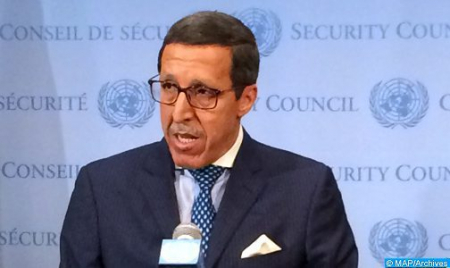Social and Economic Development is Inalienable Right to Moroccan Sahara – Morocco’s Permanent Representative to UN –
Morocco’s Permanent Representative to the United Nations, Ambassador Omar Hilale told the Committee of 24 of the UN General Assembly that social and economic development is an inalienable right to the Moroccan Sahara. “Article 1 of the United Nations Declaration on the Right to Development states that +the right to development is an inalienable human right+. This right is legitimate. It is inherent to every human being. The United Nations does not make its exercize conditional on any status, political solution, or geographical location. Moreover, this right must not be the hostage of a regional dispute, nor linked to a political settlement process, nor fall victim to the maneuvers of a separatist armed group,” Hilale told the Committee. “Aware of its responsibility towards all its citizens, Morocco has undertaken huge efforts to ensure the social and economic development and political empowerment of its Southern Provinces. Indeed, thanks to the farsightedness of HM King Mohammed VI, the Moroccan Sahara has become a model of social and economic development both in its region and in Africa, particularly since the launch, in 2015, of the New Development Model with a budget of more than 8 billion dollars,” Hilale explained. In this regard, the ambassador told the Committee “that with more than 600 structuring projects, the development strategy of Morocco in its Sahara has made the southern provinces a real driver of local, regional and continental development. This development includes road, maritime and health infrastructures, industrial hubs, agricultural and ecotourism development, promotion of research, training, the Atlantic-Dakhla port, wind farms, as well as the desalination plant for water irrigation and the Tiznit-Laayoune-Dakhla expressway project.” He added that by investing in solar energy, the southern provinces of the Kingdom have been able to boost sustainable growth through a joint mobilization of the State and public and private institutions in the region. “Moreover, citizens from the Sahara manage affairs in this region of Morocco in accordance with their right to development,” he noted. Hilale highlighted the participation of two elected officials from the southern provinces in this annual session of the C-24 since 2018, namely Ghalla Bahiya, Vice President of the Dakhla-Oued Eddahab region and M’hamed Abba, Vice President of the region of Laayoune-Sakia El Hamra. “The two representatives who are present with us today were democratically elected by their brothers and sisters. Their stories are a vivid testimony of their tireless work on the ground to ensure the development of their region,” he said. In addition, the Moroccan ambassador noted that “following the blockage by the armed separatist militia of the “Polisario” for more than three weeks of the crossing point of Guerguarate between the borders of Morocco and Mauritania, Morocco undertook, on November 13, 2020, an action to restore, once for all, the free movement of people and goods in this crossing point.” “On this occasion, I would like to reiterate to these militias of the “polisario”, who behave like bandits, that they will never again set foot in this part of the Moroccan Sahara,” Hilale said, adding that this peaceful action of Morocco, which has allowed to definitively open the crossing point, which connects Morocco to Mauritania and the rest of Africa, has been greatly welcomed both by the population of the Southern Provinces of the Kingdom as well as by several countries and regional and international organizations. With regards to the Covid-19 pandemic, the Moroccan diplomat stressed that “Morocco has adopted urgent measures to curb the spread of the virus in all cities, including the Moroccan Sahara. Hence, the Southern Provinces have one of the lowest rates of infection at the national level.”

